REFUGEE CRISIS
Last Spanish family finally escapes the ISIS stronghold of Raqqa
Madrid-based grandmother Ana Lobato to be reunited with relatives, who have left the nightmare of war behind them
Damascus
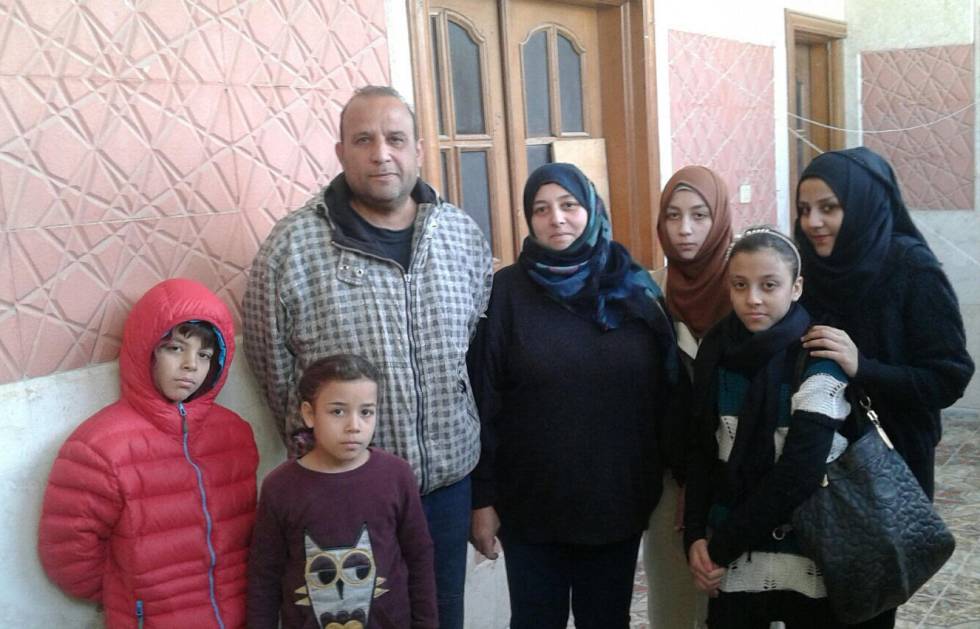
Soraya Lobato (center) with her family in Azaz. SORAYA LOBATO EL PAÍS
Yunes is four months old today. He has been on this earth for as long as his beleaguered family have been trapped in the border town of Azaz in the north of Syria. They are the last Spaniards to have left Raqqa, the stronghold of the so-called Islamic State (ISIS) that was liberated last month. Finally, Spanish diplomatic authorities in Turkey have managed to persuade the Turkish authorities to allow all 13 of them – of whom 11 are Spanish nationals and nine are minors – to cross to safety and put their four-year ordeal under ISIS behind them.
“They are to be repatriated on Thursday after spending a couple of days in custody in Turkey,” says Ana Lobato, Yunes’ grandmother, who can hardly wait for the family reunification in Madrid.
It was the start of the transition after Franco and the cost of living was high, so we decided to moveANA LOBATO, SPANISH CITIZEN WHO MOVED TO SYRIA IN 1975
Ana returned to Spain a year-and-a-half ago, to her home town of El Pozo del Tío Raimundo, in the Madrid region. She left home in 1975, at the age of 19, to travel to Raqqa with her Syrian husband Abdeladin, who had been studying to be a pharmacist in the Spanish capital. “It was the start of the democratic transition after Franco, and the cost of living was high, so we decided to move,” she explains.
A young and inexperienced housewife, she did not know that she would ultimately become an eyewitness to a convulsed history that began under the Spanish dictatorship and continued under the Syrian regime of Hafez al-Assad, who passed it on to his son Bashar 17 years ago. The couple settled in Raqqa, where they remained for the next 40 years until January 2014, when ISIS invaded the city.
Soraya is Ana’s oldest child and the only one who was born in Spain. The other three – Ismael, 39, Cauzar, 37, and Abdelsalam, 31 – were born in Raqqa, although the youngest has spent the last decade living in Greece. Her 18 grandchildren were also born in Syria, and all of them have Spanish nationality. “We lived well and we were happy,” she says. “We watched the town of Raqqa become a city, and the population grow from 30,000 to a quarter of a million.
Ana and her husband lived for six months under ISIS rule before leaving. “At first, they forced us to cover our heads,” she says. “Then we had to wear the niqab.” Her son-in-law’s pharmacy was turned into an informal workshop where their Christian neighbors learned to wear the niqab and so go unnoticed by the hisba – the religious police patrolling the streets.
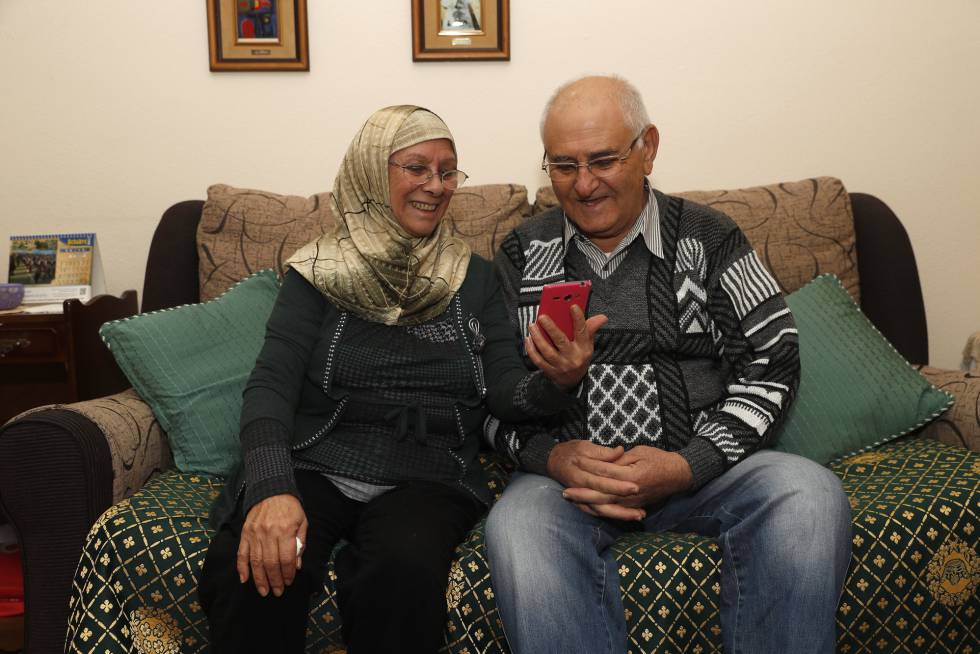
A year earlier, in May 2013, with the war making life impossible, Ana and her husband had made an abortive attempt to get the entire family out of Syria to Spain. “We spent three months in Ankara filling in forms at the Spanish embassy but my country didn’t want anything to do with me or my family. We didn’t have enough money to pay for 23 plane tickets to Spain.”
Defeated, they returned to Syria. But ISIS militiamen grew suspicious at Ana’s Spanish passport and a harassment campaign was launched against the couple. “They used to hang around my house and marked the door.” Two weeks later, Ana and her husband decided to get out for good in case they should put the rest of their family at risk by association.
After laying careful plans they made for Lebanon, where they were able to fly to Norway. Nine months later, they arrived in Madrid.
ISIS militiamen grew suspicious of Ana’s Spanish passport and launched a harassment campaign
A small woman with curly hair and a hoarse voice, Ana has since made it her business to move heaven and earth to save her family. “If the Spanish government had come to our aid in 2013, we could have avoided all of this,” she says, adding that she is, however, very grateful to the Spanish ambassador in Ankara and the business attaché to Syria, who have been a great support to the family.
Waiting for news of her family’s safe passage out of Syria gave Ana a sleepless night. For her daughter Soraya, 42, and Ismael, 39, the suspense was almost unbearable as, together with their partners and children, they waited for their fate to be decided. “I am happy but exhausted,” said Soraya from Azaz, after being told they were to cross the border. “It’s only two kilometers by car but we have to get through six border controls manned by the Free Syrian Army between Azaz and Kilis where the Spanish ambassador is waiting for us. Anything could happen.” Fortunately, nothing did.
Baby Yunes was born on July 13, 2017, in Raqqa, the headquarters of the ISIS caliphate in Syria, which is now under the control of the international coalition. He was brought into the world by cesarean section performed by a pro-ISIS female doctor from Tunisia and her anesthetist husband, as coalition planes rained bombs on the city. His birth certificate is stamped by ISIS. He is the last Spaniard to be born in the capital of the Caliphate. Shortly after his birth, he became one of 12 million refugees – 50% of the Syrian population – fleeing from the extremist group.
“We had to cross the Euphrates River in small boats,” says Soraya. “From there, we went by car and then walked for 3 kilometers over minefields with our nine children in tow, until we reached the refugee camp of Ein Issa [controlled by the Democratic Syrian Forces, led by the Kurdish militias and backed by the US].” Their neighbors, who were behind them in the civilian convoy, didn’t make it. They stepped on a mine. Despite the agony she was in due to hemorrhaging from the C-section, Hiba, Yunes’ mother, survived.
If the Spanish government had come to our aid in 2013, we could have avoided thisANA LOBATO
During the four months at the refugee camp, Soraya, Ismael and their families have been living on next to nothing. “We spent €1,250 – all our savings –to pay the traffickers that got us out of Raqqa,” says Soraya, whose husband sustained minor injuries in an ISIS attack on Azaz. But ISIS hasn’t been the only threat to their lives. “The Turkish army was bombing Kurdish positions nearby, and express kidnappings are common,” she explains. “I was afraid one of my daughters would be abducted so I didn’t allow them outside.”
Ana thanks God that her family has managed to survive the ISIS caliphate, the bombings by the Syrian government, then by the Russians and the international coalition, the minefields, the hunger and finally the rampant crime gripping the north of the country.
It’s been three weeks since Raqqa fell from ISIS control. At least 1,873 civilians died in the operation to liberate the city, which was launched in June. The Lobato family are just 13 of 200,000 refugees on the move now that Raqqa has been reduced to rubble. “Not even the door frames of my children’s houses remain standing,” says Ana. “We had better luck. Only the east side of our house has gone. But as soon as we can, we are going back.”
English version by Heather Galloway.
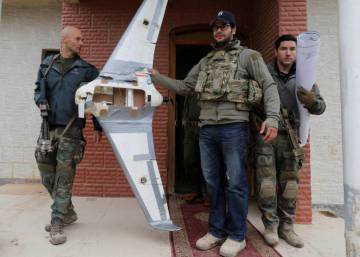
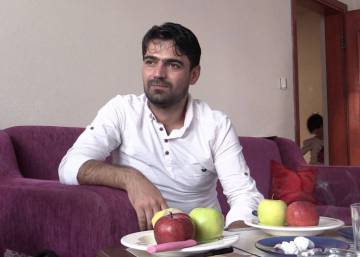
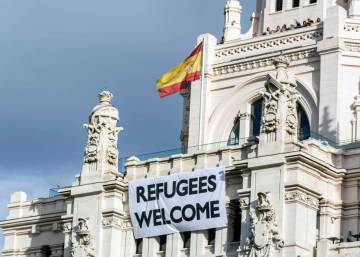
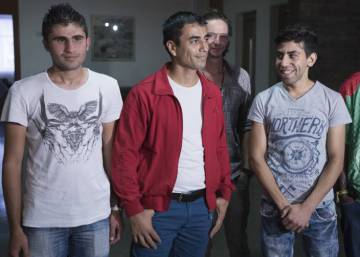





































No hay comentarios:
Publicar un comentario